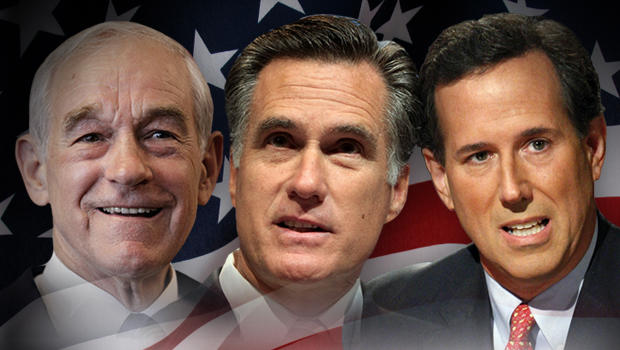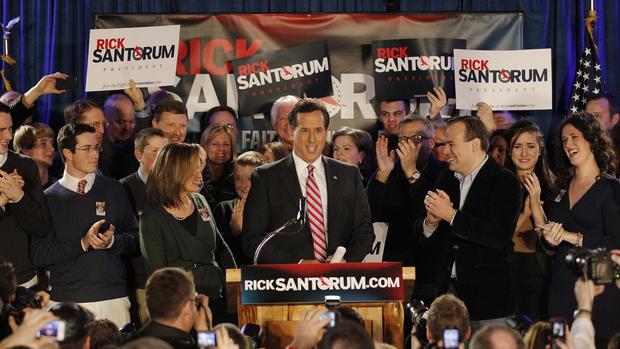Iowa caucus results: Why the race was so close
In the past six months, Iowa Republicans wavered repeatedly in their presidential preferences, sending six different candidates to the top of the pre-election polls in the Hawkeye state. Tuesday night seemingly failed to bring any greater clarity to their preferences as three different candidates -Mitt Romney, Rick Santorum and Ron Paul - finished neck and neck in the Iowa Republican presidential caucuses.
According to a CBS News poll of voters entering the caucuses, however, each of these candidates forged a markedly distinct constituency. If these bases hold up moving forward, it could be quite a competitive race for the Republican nomination.
Full Iowa results
Full Iowa entrance poll results
Mitt Romney assembled a coalition of older, wealthier, more temperate Republicans who cared much more about winning the general election than his conservative credentials or religious background.
Romney was the preferred choice among mainstream Republicans. A third of Iowa caucus goers were self-identified Republicans who considered themselves somewhat conservative or moderate on political matters. Romney won a sizable plurality of these groups, receiving support from 37 percent of somewhat conservative Republican voters and 48 percent from moderate Republican voters. This bodes well for Romney in upcoming contests with less conservative Republican electorates than Iowa, such as Florida and Nevada.
Romney received strong support from wealthy voters. Among those 27 percent of caucus goers with family incomes of $100,000 or more, Romney won 36 percent support. This far surpassed the support of Santorum his closest competitor who received only 23 percent of their vote.
Romney also received solid backing from senior caucus goers. Of the quarter of attendees who were 65 years of age and older, Romney garnered 32 percent of their votes. This easily outpaced Rick Santorum and New Gingrich who secured respectively 19 and 17 percent of their vote.
Romney's appeal was clearly driven by perceptions that he can win the general election. Of all the candidates on the ballot, a greater proportion of Romney's supporters - 63 percent - indicated that his ability to defeat Barack Obama was his most important candidate quality. Twenty-two percent cited his experience as the candidate quality that mattered most in their vote for him, 11 percent cited his moral character, and only 1 percent cited his conservatism.
Romney remains unloved -- but it's his race to lose
Full CBS News coverage: Mitt Romney
Rick Santorum drew his support primarily from evangelicals and Tea Partiers, the two most hotly contested groups during the campaign. More than half of Iowa caucus-goers - 58 percent - described themselves as born-again or evangelical Christian. Of these Santorum secured 32 percent of their support, the only candidate to top 20 percent. Although nowhere near the 46 percent received by Mike Huckabee, it still proved enough to push him to the forefront Tuesday night. If Santorum can unite the support of evangelicals in upcoming states, such as South Carolina and Missouri, he will continue to be a formidable opponent.
Santorum also did quite well with voters identifying with the Tea Party. Among Iowa caucus goers, 34 percent strongly supported the Tea Party movement. Santorum secured 30 percent of their votes, easily outpacing Newt Gingrich who received 17 percent of their support.
Santorum's supporters were clearly attracted by his religious character. Roughly a third (32 percent) of his supporters reported his position on abortion mattered more than any other issue in their vote. Moreover, 40 percent of his supporters identified his strong moral character as the candidate quality that mattered most to them. No other candidate topped these numbers on either measure.
Full CBS News coverage: Rick Santorum
Ron Paul's libertarian, isolationist message appealed to young and independent voters on Tuesday night. Paul was the preferred choice of young people, who comprised 31 percent of caucus goers. He was backed by 48 percent of those under 30 years of age. Among Gen X-ers - those caucus goers between 30 and 44 years of age - Paul won a plurality, receiving 28 percent of the vote.
Similarly, Paul won the support of the 38 percent of voters attending their first Iowa Republican presidential caucus. He received 34 percent support from first time caucus-goers, easily outpacing Santorum and Romney who received respectively 22 percent and 17 percent support.
Paul also attracted considerable backing from self-identified independents. Independents comprised nearly a quarter - 23 percent - of caucus-goers. Paul won a whopping 44 percent support from them, compared to only 18 percent for Romney and 13 percent for Santorum.
Although few political observers give Paul much of a chance to be the Republican nominee, it was this combination of young and independent voters that propelled Barack Obama to victory in Iowa and eventually the Democratic Party nomination in 2008. It is worth noting that Ron Paul had the most passionate support of any of the candidates Tuesday night. Nearly three quarters (73 percent) of his voters strongly favored him, compared to 63 percent for Santorum, 62 percent for Perry, 58 percent for Gingrich and only 56 percent for Romney.
Full CBS News coverage: Ron Paul
Iowa's bad track record for picking GOP winners
Full GOP Primary Results
Poll results discussed in this article are based on a National Election Pool entrance poll conducted by Edison Media Research. Interviews were conducted with 1737 caucus attendees as they entered caucus sites around the state. The margin of error for the poll is +/-2 percentage points.

